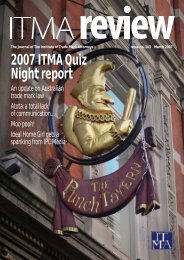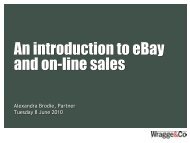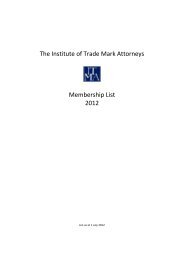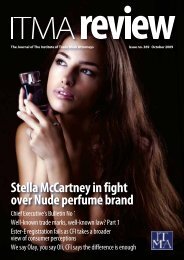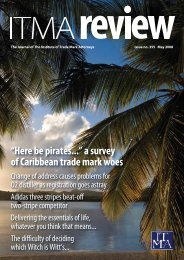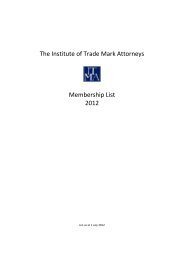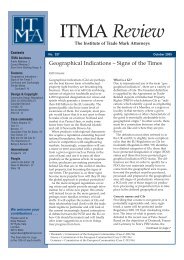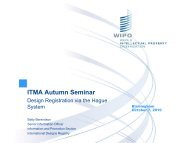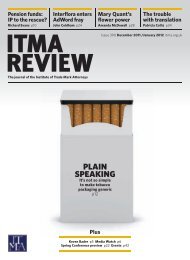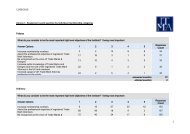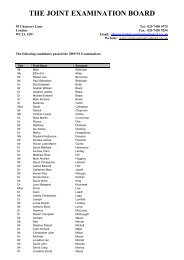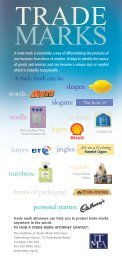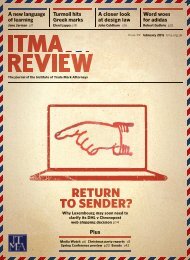ITMA 322 APRIL 2005
ITMA 322 APRIL 2005
ITMA 322 APRIL 2005
Create successful ePaper yourself
Turn your PDF publications into a flip-book with our unique Google optimized e-Paper software.
Design & Copyright<br />
The Costs of Copying Precedents<br />
London General Holdings Ltd & Ors v USP PLC & Anor [<strong>2005</strong>] EWCA Civ 931<br />
This was an appeal regarding the level and basis of<br />
damages and royalty awarded in respect of a precedent<br />
document that had been copied by a competitor.<br />
The defendants offered a wide range of financial<br />
services including extended warranties for electrical<br />
goods. These extended warranties were classified as a<br />
form of insurance and consequently attracted insurance<br />
tax. In the 1997 budget, the insurance tax<br />
payable on premiums was raised from 2.5 % to 17.5%.<br />
In 1998 a series of draft documents was developed<br />
by the second claimant, Unicorn, to provide an<br />
extended warranties scheme which would not be<br />
liable for insurance tax (the New Scheme). One of the<br />
documents was the Collections Account Agreement<br />
(CAA). This was not a finished document as it<br />
required alteration and development to be effective,<br />
but it contained the ideas on which the New Scheme<br />
was based. These included the implementation of a<br />
trust which was a necessary component if the New<br />
Scheme were to avoid insurance tax liability.<br />
In 1999 Unicorn assigned all of its intellectual property<br />
rights, including the copyright in the New<br />
Scheme including the CAA and other documents, to<br />
the First Claimant, USP.<br />
Scottish Power<br />
In 1997/1998 Scottish Power, one of the first defendant’s<br />
(LGH) customers, was interested in setting up<br />
an extended warranty scheme which avoided the<br />
insurance tax premiums. Both LGH and Unicorn<br />
made presentations to Scottish Power, who favoured<br />
Unicorn’s scheme. However, the new Scottish Power<br />
scheme was to be administered by LGH.<br />
During negotiations to determine the exact wording<br />
of the documents required for the Scottish Power<br />
scheme, LGH and Unicorn signed a mutual confidentiality<br />
agreement. The CAA was then sent to LGH.<br />
This draft was subsequently reworked to create an<br />
effective document, but in essence remained faithful<br />
to the substance of the draft CAA. LGH saved an<br />
electronic version of the redraft. It was this electronic<br />
version of the redrafted CAA, and clones of this<br />
redraft, which made up the infringing copies and on 8<br />
November 2002 the High Court held that LGH had<br />
infringed USP’s copyright and was entitled to damages.<br />
The Apollo contract<br />
In April and early May 1999 LGH used the saved<br />
electronic version of the redrafted CAA to prepare a<br />
document as part of a trust-based scheme for Apollo<br />
2000 Limited (Apollo). LGH also sent the redrafted<br />
CAA to a firm of solicitors for advice.<br />
At the trial for liability only, Judge Weeks held that<br />
the use of the redrafted CAA infringed the copyright<br />
in the original draft CAA. At the damages inquiry<br />
LGH was found to be liable for the infringements<br />
relating to Apollo. However, there were two other<br />
incidents of the redrafted CAA being used in similar<br />
ways to the Apollo contract.<br />
In the damages inquiry Master Price held, in relation<br />
to Apollo, that “the right way to proceed to<br />
assess these damages is by way of notional royalty”.<br />
He then awarded £15,000 by way of compensation for<br />
the labour and skill involved in producing the template<br />
CAA as a notional royalty, but did not comment<br />
on the other times LGH used the redrafted CAA to<br />
provide extended warranty schemes which were<br />
based on the New Scheme.<br />
The Powerhouse contract<br />
The main issue in the appeal related to a claim for<br />
damages in respect of a contract to provide this trustbased<br />
extended warranty scheme with another company,<br />
Powerhouse. LGH and USP were in competition<br />
with each other for this contract.<br />
LGH used the electronic version of the redrafted<br />
CAA to prepare documents for a trust-based extended<br />
warranty scheme. LGH disclosed the existence, but<br />
not the actual text, of the redrafted CAA to<br />
Powerhouse as the basis for LGH’s scheme.<br />
Powerhouse was initially concerned about the robustness<br />
of LGH’s scheme although it was “keener on<br />
price” than the scheme offered by USP. Accordingly,<br />
LGH took advice and after further discussions,<br />
Powerhouse was persuaded that LGH’s scheme was<br />
sufficiently robust. It was not suggested by either of<br />
the parties that Powerhouse had actually seen a copy<br />
of the redrafted CAA.<br />
Powerhouse then told USP about the alternative<br />
LGH scheme. As a result, USP subsequently reduced<br />
its price, to the effect that USP would make £111,720<br />
less profit over the lifetime of the scheme. USP was<br />
awarded the contract and sought to claim the loss of<br />
profit from LGH for infringement of copyright.<br />
At the damages inquiry Master Price awarded USP<br />
damages of £126,720 consisting of £111,720 for loss of<br />
profit in relation to the Powerhouse contract and a<br />
notional royalty of £15,000 in relation to the Apollo<br />
contract.<br />
Appeal<br />
At the appeal LGH argued that there had been double<br />
recovery because USP had been awarded both damages<br />
and notional royalty in respect of the contract<br />
with Powerhouse. However, the Court of Appeal said<br />
that this argument was “misconceived”, as an infringing<br />
copy could be put to several uses, each of which<br />
could give rise to a separate damages claim.<br />
The Court of Appeal also dismissed LGH’s arguments<br />
that a lack of foreseeability and lack of causation<br />
meant that the loss of profit in the Powerhouse<br />
contract was not attributable to the breach of copyright<br />
in respect of the draft CAA. The court dismissed<br />
this argument, but said that the damages award for<br />
the loss of profit should be struck off in any event,<br />
Continued on page 12<br />
December <strong>2005</strong> <strong>ITMA</strong> Review 11



